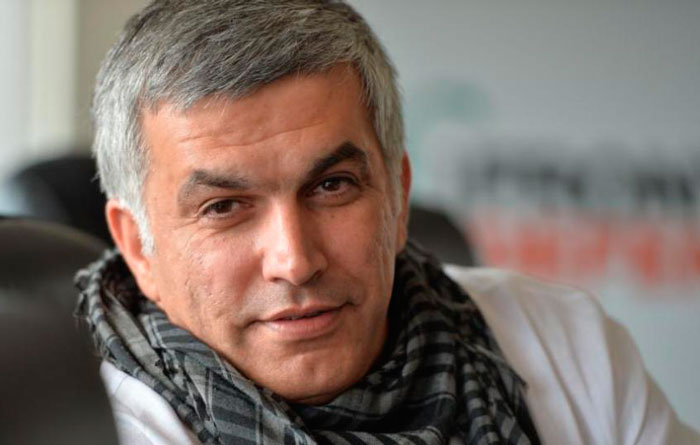[vc_row][vc_column][vc_single_image image=”81222″ img_size=”full” add_caption=”yes”][vc_column_text]The Bahraini human rights activist Nabeel Rajab was due to be sentenced on 23 January but this was postponed for an eighth time. Rajab’s ninth trial date on charges of “spreading rumours in wartime,” “insulting a statutory body” and “insulting a neighbouring country” (Saudi Arabia) – all of which are related to comments on Twitter – will be 21 February.
A tweet by Index, which Rajab shared, is being used as evidence against him. He is the winner of a 2012 Index on Censorship Freedom of Expression Award for his efforts in speaking out against human rights infringements by Bahraini government in 2011 and was a judge of the Index on Censorship Freedom of Expression Awards in 2016.
“Bahrain’s continued judicial harassment of Nabeel Rajab only serves to mar the country’s image in the international community,” Melody Patry, head of advocacy at Index on Censorship, said. “This latest postponement is just more evidence of the Bahraini government’s disregard for global human rights norms. We urge Bahrain to immediately drop all charges against him.”
Rajab was arrested and sentenced in 2012 for voicing his critical opinions about Bahraini authorities and for leading pro-democracy protests. He has since been released and re-arrested multiple times, and his time spent in solitary confinement and unclean conditions have caused a serious decline in his health.
Rajab also faces numerous other charges, including for a letter he wrote to the New York Times in September 2016 and an opinion piece in Le Monde in December 2016.
Sayed Ahmed Alwadaei, director of advocacy at the Bahrain Institute for Rights and Democracy, said: “Nabeel Rajab faces over 17 years in prison for these pathetic charges. Now the UK is setting a dangerous precedent in providing bombs and jets to Saudi Arabia and Bahrain, worth billions, while watching in silence as rights campaigners who took a principled stance against wars and torture are harshly punished.”
There are many who face a similar plight in Bahrain. Although it is considered to be one of the most connected countries in the world in terms of technology, Bahrain has a reputation for regularly blocking critical news, as well as human rights and opposition websites. Social media is strictly monitored and the government routinely revokes the citizenship of many of its critics, rendering them stateless.
Ebrahim Sharif, former secretary-general of the secular, left-wing National Democratic Action Society, was sentenced on 13 November 2016 to a three-year prison sentence for “inciting hatred against the regime” after speaking to the Associated Press.
He was sentenced to five years in prison in 2011 for the same charges. After facing brutal torture and imprisonment in solitary confinement for 56 days, Sharif received a royal pardon on 19 June 2015. He served four years and three months in prison.
Sharif is a member of the Bahrain 13, a group of high-profile human rights advocates who were arrested, tormented and sentenced by a Bahraini military court in 2011.
Many other activists have been jailed for exercising their right to free expression. Zainab Al-Khawaja is currently in exile in Denmark, where she is a dual citizen, with her two young children. They arrived there on 6 June 2016 after she was threatened with new charges that would result in long sentences and separation from her children, following her release a week earlier.
Her father, Abdulhadi Al-Khawaja, is currently serving a life sentence for the part he played in the 2011 demonstrations in Bahrain. He was head of the 2012 Index Award-winning Bahrain Center for Human Rights with Nabeel Rajab. Al-Khawaja’s sister Maryam is also currently in exile in Denmark.
In 2015, the Liberties and Human Rights Department of Al-Wefaq National Islamic Society verified 1,765 opposition-related arrests. These included the incarceration of 120 children and five women.
On 9 October 2016, sports journalist Faisal Hayyat was arrested and sentenced to three months in prison by a Bahraini criminal court due to a tweet allegedly insulting the Sunni sect of Islam. Hayyat was also arrested in April 2011 for involvement in pro-democracy protests. He wrote on Facebook a few days before his most recent arrest about the extreme physical, psychological and sexual torture he endured while imprisoned.
Writer, blogger and president of the Women’s Petition Committee, Ghada Jamsheer, began her ten-month combined sentence on 15 August 2016. She was jailed in Bahrain for exercising her right to free expression on Twitter. She requested to be freed in order to serve the remainder of her sentences outside of the prison due to her debilitating rheumatoid arthritis, but the judge has yet to inform her of his decision.
On 17 July 2016, the Bahraini Public Prosecution decided to charge Nazeeha Saeed, an award-winning correspondent for Radio Monte Carlo Doualiya and France24, for illegally working for international media. In June 2016 Saeed faced a travel ban without her knowledge, only to discover that she could not leave the country when she wasn’t allowed to board a flight.
Many other journalists working for international media outlets have faced similar threats, including Sayed Ahmed Al-Mousawi, who was stripped of his citizenship in November 2015.
Bahrain continuously stifles free speech and silences critics. It also has the highest prison population per capita in the Middle East, including 3,500 prisoners of conscience.[/vc_column_text][/vc_column][/vc_row][vc_row][vc_column][vc_basic_grid post_type=”post” max_items=”4″ element_width=”6″ grid_id=”vc_gid:1485190510938-e7ffcac4-a5c4-10″ taxonomies=”3368″][/vc_column][/vc_row]





